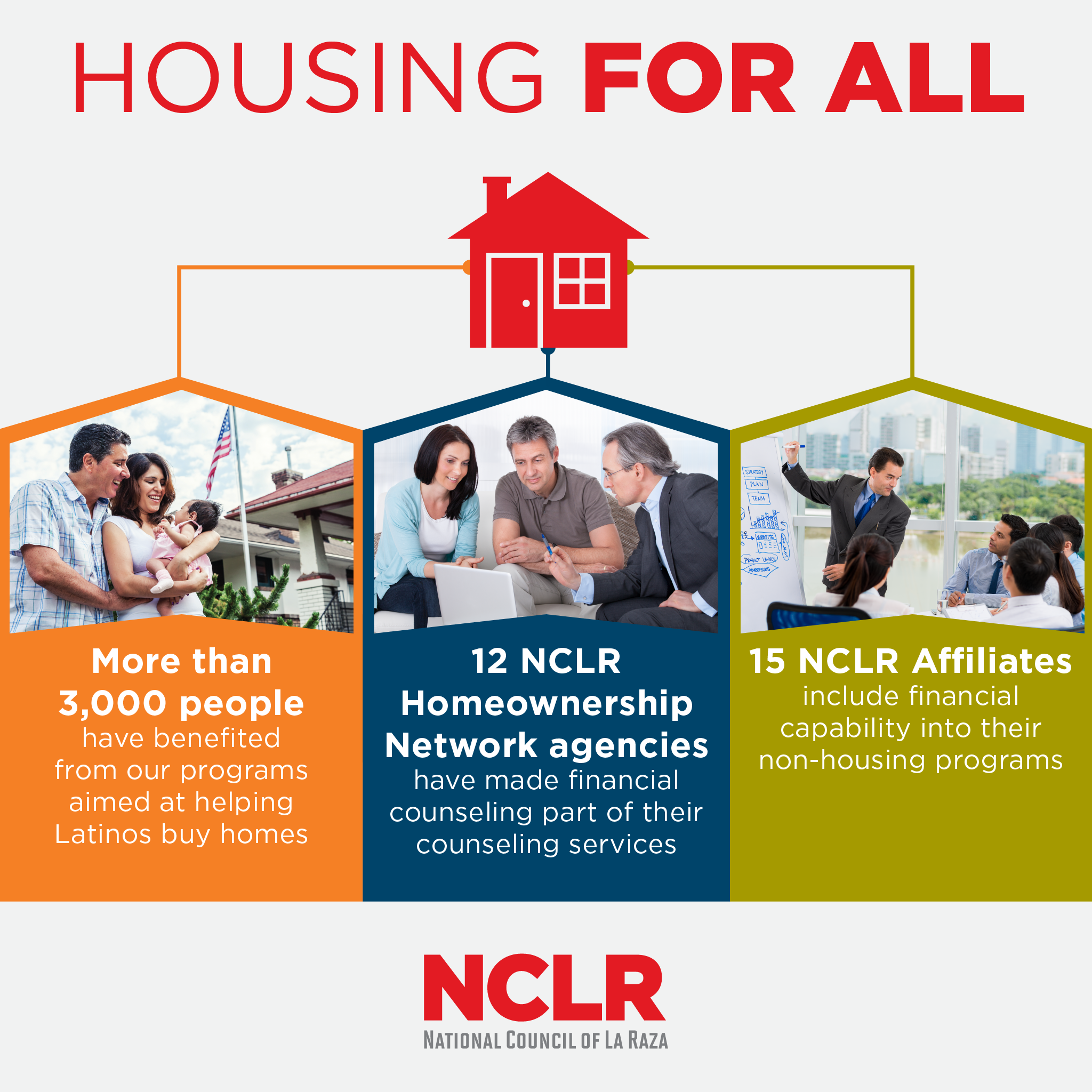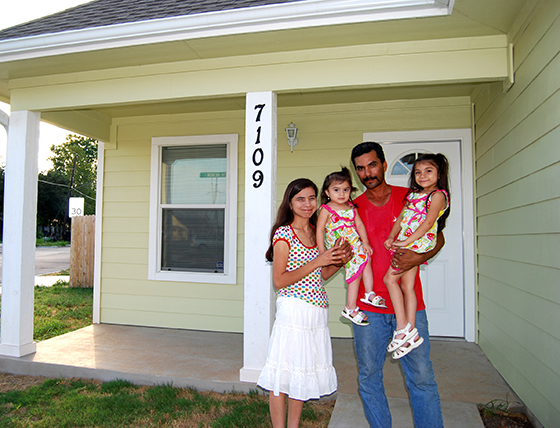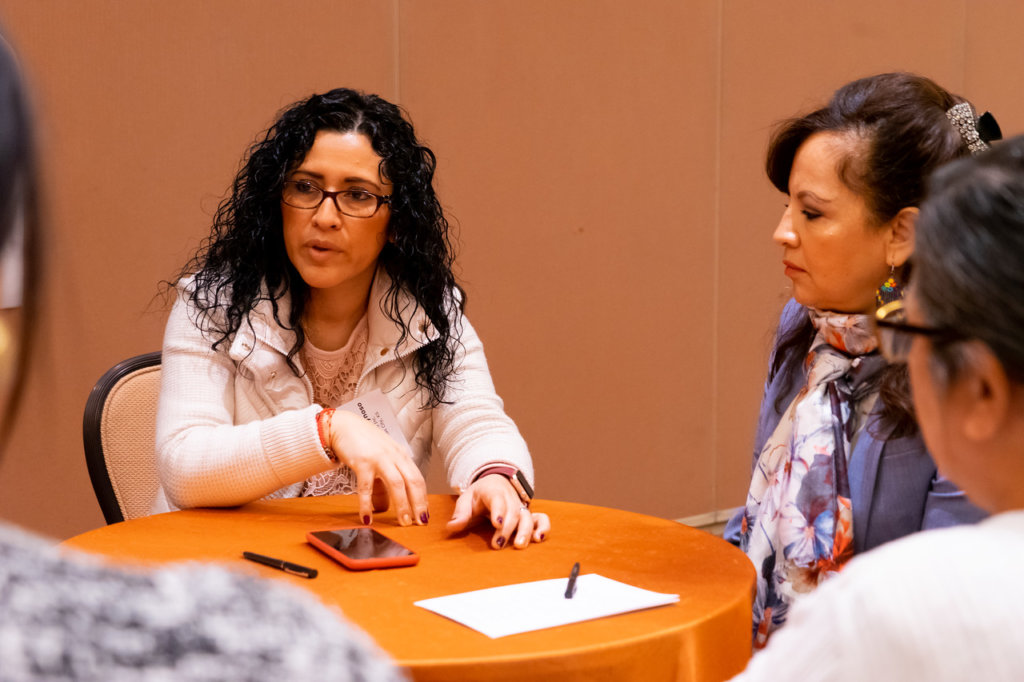Celebrating Financial Capability Efforts to Support Latino Financial Well-being
By Agatha So, Policy Analyst, Economic Policy Project, NCLR
Financial Capability Counseling gives Latino families the information and tools needed to improve credit, increase savings, and build wealth. Through participation in a financial capability program, Latino families can access a range of resources and learn how to use skill-building tools and financial products that will help them achieve their financial goals, such as homeownership.

Keep up with the latest from UnidosUS
Sign up for the weekly UnidosUS Action Network newsletter delivered every Thursday.
For Affiliate partners of the NCLR Homeownership Network (NHN), building families’ financial capability has never been more important. Because of the financial crisis nearly a decade ago, millions of Latino families saw their savings disappear when they lost their homes to foreclosure. At the same time, a rise in unemployment among Latino workers made it harder for families to the get the assistance they needed to save their homes. Today, a generation of Latino families are still recovering and trying to repair the damage to their credit when they lost their homes. Rebuilding by understanding how to budget, save, and improve credit is critical to economic recovery and the ability for Latinos to become homeowners.
We spoke with NCLR’s Katherine Rios, Associate Director, Financial Capabilities, Housing and Community Development, to learn more about financial capability programs implemented by the NHN, and how she become involved in the effort to improve Latinos’ financial capability.
NCLR: How long have you been helping Latinos achieve their financial goals?
Rios: NCLR has been working with our Affiliates to help deliver effective financial capability services through existing programs since 2011. I have engaged with our Affiliates’ programs in the area of financial capability for the past three years. In that time, we have been working with Affiliates to identify the ways that NCLR can most effectively support their work and their communities. We have been laying the groundwork to identify and create opportunities to engage new funders and partners who want to support financial capabilities within the Latino community.
NCLR: What is the “Financial Capability Network” and how long have you been working with the network of providers?
Rios: We started with a number of projects that helped NCLR Affiliates find ways to efficiently and effectively incorporate financial coaching into their existing programs. Primarily, we have focused on supporting Affiliates in the NCLR Homeownership Network to incorporate financial counseling into their housing counseling services. We have also tried to intersect financial capability with workforce development programs, Comprando Rico y Sano (programs promoting healthy eating and food choices), parent engagement programs, and immigration legal services. Since 2014, NCLR has invested in more than 20 NCLR Affiliates’ program models, and provided extensive training and resources to many more through various training opportunities.

NCLR: How does financial capability help Latinos reach their financial goals?
Rios: Everyone works on their financial capability, at every point in their lives. A person’s financial capability needs constant nurturing. NCLR’s Affiliate network, which is nearly 300 strong, reaches communities with a diversity of needs. Our Affiliates meet people across this spectrum—some have very little income, but are completely in control of their expenses, while others have many assets but no plan on how to best work with them. Financial capability is about setting goals and having dreams, and coming up with a plan to pursue those dreams. It is also helpful for people without access to mainstream financial services. Financial capabilities can be skills and habits that people learn from parents and their peers. People who are new to this country or to the financial system may lack exposure to the best ways to make the most for themselves and their families. NCLR believes it is critical that financial capability becomes incorporated in the work of Affiliates because it’s a part of empowering the Latino community.
NCLR: How is “financial capability” different from “housing counseling”?
Rios: Housing counseling is typically focused on a specific question or issue that a person has that is related to their housing, such as how much can she afford in rent, or how does he avoid losing his family home to foreclosure. Usually the work that is provided is targeted at answering that question, involves looking at the person’s income and credit, and focuses on financial well-being. The service tends to end once the question is answered. Financial capability is more holistic. We tend to think about it as a combination of a person’s knowledge, skills, behaviors, and habits. Counselors and program staff try to promote those while helping clients get access to products and services that help them achieve improved financial stability and well-being. We think about capability as not focused on a question but oriented around a goal that a person has – we provide financial capability services to help people articulate a goal and then help them come up with a plan to get there.

NCLR: What kind of financial capability tools do housing counselors use to help Latino families achieve the dream of homeownership?
Rios: I think first-time homeownership counseling is a good example of why it’s important to integrate financial capabilities into housing counseling. Often when housing counselors work with a first-time home buyer, the buyer’s questions are usually about the house – what neighborhood they want to live in, the homebuying process, the different players such as title company, lender, and real estate agent. What’s easy to forget, particularly if a person is financially stable enough to qualify for a mortgage, is that during the housing counseling process there’s an opportunity to talk about how owning a home will help that family in the long-term with their financial well-being, what their financial responsibilities are once they become homeowners, and how to make their asset count for them in the most meaningful way.
NCLR: In your experience, what can service providers do to integrate financial capability into their programs and direct services?
Rios: For providers who would see this as an opportunity to provide a new service, one of the most important things to consider are the questions about financial issues that you hear from your clients and community, as well as finding the right moment in your program to integrate financial capabilities. We can’t emphasize enough how important it is to catch people at a time when they are motivated – when they are ready to make a change, or when they would like to address something that is bothering them in their lives. Counselors and staff can help their clients realize there is a financial element to every major decision they make, and help them understand the financial implications of the change they are facing. Lastly, we would encourage providers new to this to consider who else in the community could be strong partners, especially in a situation where one program can help a client up to a certain point, and then they are referred to a partner for on-going support.
NCLR: How many Latino families have been helped by the Financial Capability Network?
Rios: Historically our pilot projects have helped a few thousand people through integrated services. Through a pilot that we’re just beginning that will connect our Affiliates to one another in new ways, we hope to see up to 40,000 reached with a targeted financial message—that if received at the right time—can move people into on-going financial coaching services. We hope to see 2,000 people make their way through financial coaching by our Affiliates in the next two years.



